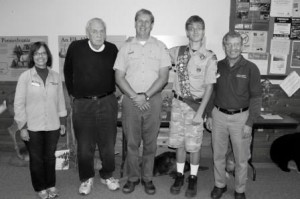
Why save the monarch butterfly? The majestic monarch butterfly is an essential part of the ecosystem and in desperate need of help.
Once a common sighting in backyard gardens, the orange-and-black butterfly known for its long migration is on a dramatic decline. There are several factors for the demise of the milkweed-dependent butterfly. Luckily, there’s a lot to do to help.
Eagle Scout Candidate and local community steward, Casen Zitzelberger, son of Gregory and Jacqueline Zitzelberger, dedicated the new Snetsinger Satellite Monarch Butterfly Garden on Saturday during a program held at Parker Dam State Park. His project was a collaborative effort between the Snetsinger Butterfly Garden (SBG), Penn State Master Gardeners, Parker Dam State Park and the Presbyterian Boy Scout Troop No. 2.
Program information was shared by the following individuals, from left to right, Pam Ford, Penn State master gardener in Centre County; Dr. Bob Snetsinger, professor emeritus of Entomology at Penn State University; Carey Huber, state Department of Conservation and Natural Resources, Parker Dam State Park environmental education specialist; Zitzelberger; and Doug Ford, Penn State master gardener in Centre County.
Zitzelberger approached Parker Dam State Park with a mission to complete his Eagle Scout service project. He adopted the garden this spring because of his interest in nature and improving outcomes for the Monarch butterfly in this region. Penn State Master Gardeners in Centre County provided guidance in designing and choosing native Pennsylvania plants to attract butterflies especially Monarchs.
The number of Monarch butterflies has dramatically decreased this year. One reason for their decline is the increased use of genetically modified corn grown in the Midwest. Researchers from University of Kansas reported that these crops are not grown for higher production, but also to kill off native species like the common milkweed.
Monarch butterfly caterpillars are dependent on common milkweed to thrive and mature into butterflies. These second generation butterflies are those migrants found in Pennsylvania.
During the program butterfly enthusiasts, Snetsinger and his wife, Wendy, shared their experience creating a three-acre butterfly garden in cooperation with the Tom Tudek Park located in State College. The park was dedicated in memory of their daughter, Clare, and the Tudek family’s son, Tom, who both died tragically at 17 years old.
Both young adults had an interest in butterflies. The Snetsinger Butterfly Garden’s mission is to educate the public about the importance of butterfly conservation and ecosystems, many of which are endangered throughout the world. Events and activities at the park are scheduled throughout the summer and posted online at www.snetsingerbutterflygarden.org.
Penn State Master Gardeners and outreach educators for the SBG, Pam and Doug Ford, encourage local residents to help improve the outcome for butterflies and other pollinators by also volunteering to become community stewards. Currently, PSU Master Gardeners work with schools, neighborhood groups and community organizations to develop butterfly and pollinator friendly habitats by creating satellite gardens.
Anyone can attract beautiful butterflies by growing native host and nectar plants. Bee Balm, Common Milkweed, Asters and many others are available at the annual Master Gardeners’ Native Plant sale. These plants are easy to grow since they thrive in all types of soil with limited water.
These plants are available in a variety of colors and sizes with varying bloom times from spring to fall. Information about the sale and list of plants is available on the SBG Web site.
During a camping trip or picnic, visit the new SGB satellite garden and other pollinator gardens at Parker Dam State Park. For more information about creating your own butterfly garden, contact the Penn State Master Gardener’s hotline at 814-355-4897 or CentreMG@ag.psu.edu.
Several community organizations donated supplies for the project, including Down to Earth Garden Club and Alvetro’s Landscaping in DuBois, Tammy’s Greenhouse, Bonnie’s Greenhouse, TD Fabricating and Welding and Swisher Concrete. These organizations realized the importance of the garden and the hard work and dedication to complete this Eagle Scout service project.